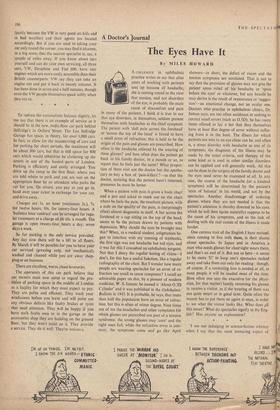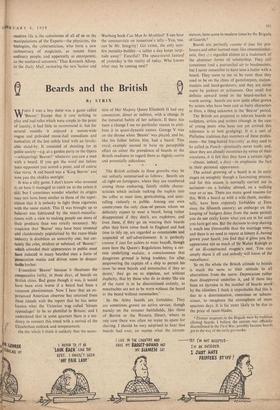A Doctor's Journal
The Eyes Have It
By MILES HOWARD A COLLEAGUE in ophthalmic practice writes to say that after years of working with patients sent up because of headache, she is coming round to the view that tension, and not disorders of the eye, is probably the main cause of discomfort and pain in many of the patients. I think it is true to say that eye disorders, in themselves, seldom present themselves with headaches as the chief symptom. The patient with 'dull pain across the forehead' or 'across the top of the head' is found to have a small error of refraction; this is held to be the origin of the pain and glasses are prescribed. How often, is the headache relieved by the wearing of these .glasses? and how often does the patient go back to his family doctor, in a month or so, to report that he feels just the same? What propor- tion of them visit not the doctor but the apothe- cary to buy a box of `pain-killers'?—so that the doctor, noticing that the patient hasn't returned, presumes he must be better.
When a patient with pain is given a body chart and a pen and asked to mark out on the chart where he feels the pain, the resultant picture, with a note on the quality of the pain, is (surprisingly often) almost diagnostic in itself. A bar across the forehead or a cap sitting on the top of the head, seems to be the picture drawn by patients with depression. Why should the eyes be brought into this? When, as a medical student, astigmatism be- gan to interfere with my conning of textbooks, the first sign was not headache but red eyes, and it was for. this I consulted an ophthalmic surgeon. Not that I decry the regular testing of vision—I don't, for this has a useful function, like a regular radiography of the chest. But I wonder how many people are wearing spectacles for an error of re- fraction too small to cause symptoms? I recall an admirable paper on this, by a pioneer of modern medicine, W. S. Inman; he named it 'About O.5D Cylinder' and it was published in the Ophthalmic Bulletin in 1943. It is probable, he says, that more than half the population have an error of refrac- tion, but this is often of minor degree. Nine times out of ten the headaches and other symptoms for which glasses are prescribed are part of a tension syndrome; the wrong glasses may 'cure' and the right ones fail; while the refractive error is con- stant, the symptoms come and go like April showers—in short, the defect of vision and the tension symptoms are unrelated. That is not to say that the provision of glasses may not give the patient some relief of his headache or 'spots before the eyes' or whatever, but any benefit he may derive is the result of reassurance or 'sugges- tion'—an emotional change, not an ocular one. Doctors who practise in ophthalmic clinics, Dr. Inman says, are too often assiduous in seeking. to correct small errors (such as O.5D); he has many times offered to lay a bet that they themselves have at least that degree of error without suffer- ing from it in the least. The illness for which patients are sent to an eye clinic can be, and often is, a stress disorder with headache as one of its symptoms; the diagnosis of the illness may be made by the' usual criteria, and therapy of the same kind as is used in other similar disorders can be applied and will generally work. All this can be done in the surgery of the family doctor and the eyes need never be examined at all. In any case, the course of the headache (or a kindred symptom) will be determined by the patient's `state of balance' in his world, and not by the spectacles. Another disadvantage of ordering glasses where they are not needed is that the patient's attention is thereby directed to his eyes, which he will then (quite naturally) suppose to be the cause of his symptoms, and so the task of dealing with the real causes of the illness is made harder.
One curious trait of the English I have noticed, since coming to live with them, is their shame about spectacles. In Japan and in America a man who needs glasses for clear sight wears them, and that's an end of it. But not so here—it seems to be more Tr to keep one's spectacles tucked away and take them out only for reading: though, of course, if a correcting fens is needed at all, in most people it will be needed most of the time. How often one sees the executive '(or the physi- cian, for that matter) hastily removing his glasses to receive a visitor, as if the wearing of them was not quite smart or in good taste. Quite often the wearer has to put them on again at once, in order to see what the visitor looks like. What does pll this mean? What do spectacles signify to the Eng- lish? Has anyone an explanation?
'I am not indulging in science-fiction whimsy when I say that the most menacing aspect of modern life is the submission of all of us to the manipulations of the Experts—the physicists, the biologists, the cyberneticians, who form a new technocracy of magicians, as remote from ordinary people, and apparently as omnipotent, as the mediaeval sorcerers.' Thus Kenneth Allsop, in the Daily Mail, reviewing the new Secker and Warburg book Can Man be Modified? '1 can hear the commercials on tomorrow's telly—You, too, can be Mr. Integrity! Get ETHIK, the only sure- fire morality-builder—a tablet a day keeps turpi- tUde away!' Fanciful? The space-travel fantaq of yesterday is the reality of today. Who knows what may be coming next?







































 Previous page
Previous page